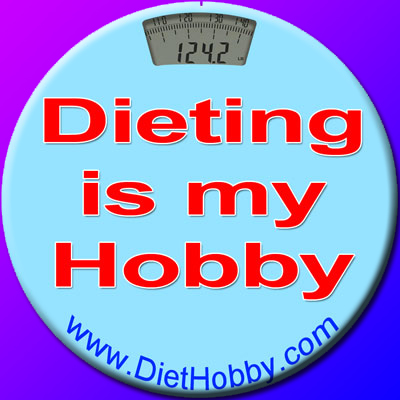Status Update - March 2014
- POSTED ON: Mar 18, 2014

My New Year's resolution
was to lose 20 pounds by the end of 2014.

I only have 25 lbs to go.
Food Diary Benefits
- POSTED ON: Feb 21, 2014

![]() For the past 9 ½ years … every day … I have consistently logged all of my food intake into a food journal, using a computer software program. The use of this basic tool has been the foundation of my weight-loss and long term maintenance of that weight-loss.
For the past 9 ½ years … every day … I have consistently logged all of my food intake into a food journal, using a computer software program. The use of this basic tool has been the foundation of my weight-loss and long term maintenance of that weight-loss.
Here's a recent post by Canadian obesity specialist, Dr. Yoni Freedhoff of WeightyMatters about the benefits of keeping a Food Diary.
"What if I told you that in just two minutes a day you can double your weight loss success? And, rest assured, those two minutes won’t be spent busting out painful sweat while a trainer yells at you, or over a hot stove cooking a gourmet vegan meal.
Instead, spend those two minutes keeping track of what you’re eating by tapping on a smartphone or scribbling in a journal. Studies have shown that the amount of weight you’re liable to lose in a weight-loss program will be double that if you undertook that same effort, but didn’t keep a food diary.
No, food diarizing isn’t exactly sexy, and no, it probably can’t be fairly described as a whole hoot of fun, but it sure is easy these days.
Back in 2004 when I started working with patients on weight management there were no smartphones and diaries were just that – paper diaries that required a person to not only jot down what they were eating, but also to spend real time flipping through other books that provided calorie listings.
Nowadays we’ve got it easy. There’s a wealth of apps that do all the heavy lifting for us and not having missed a day of food diarizing since May 7, 2011, I can tell you, two minutes a day might even be an exaggeration of the actual time and effort required in keeping one.
While food diaries don’t cause you to burn calories directly, they do play three crucial roles:
Firstly food diaries give you some sense of where you’re at. Thinking of calories as the currency of weight (or frankly whatever else you might want to track – points, carbs, etc.,) keeping a careful accounting of your spending will help you with their budgeting. It’s important here to note that it’s not about never spending your calories, but rather using your records to pick and choose which ones are truly worth it. Why waste your calories on foods you don’t adore?
Secondly food diaries become fabulous investigational tools. By tracking patterns of hunger, cravings or food intolerances, patterns can appear and then instead of focusing on trying to deal with the downstream problem of trying to will yourself away from the cookies, you can instead focus on those cookie craving’s upstream cause to nip them in the bud. Giving you an example from my life, I’ve learned that if I have a breakfast without at least 20 grams of protein I have much more difficulty with food cravings at night. By ensuring my breakfasts are well organized I don’t need to battle with my dietary demons at night.
Thirdly food diaries are what habits are made of. Behavior change is difficult and habit formation is lengthy. Forget about that nonsense of three weeks to form a habit, scientific studies would suggest that even the simplest of singular habits can take months or even years to establish. (For instance, one study aimed to measure the time it takes to develop the habit of drinking a daily glass of water which took some participants over eight months to master.)
No doubt improving one’s lifestyle is rarely simple and usually encompasses dozens of small changes. What’s truly required for new behaviors to become new habits is the act of consciously reminding yourself of those behaviors you’re hoping to change, and each and every time you tap a food into your food diary that’s precisely what you’ll be doing.
At the beginning, keeping a food diary might take as many as 10 minutes a day, however as you build up your personal foodscape’s database, the time required shrinks dramatically.
If weight’s your concern – or even if you’re simply looking to improve the healthfulness of your diet – don’t worry about how many hours you’ll need to spend exercising every week. Prioritize the mere moments you’ll need to spend diarizing each day as two minutes of daily effort for double the weight loss – well that’s an exceedingly fair price to pay."
Maintenance Status Report - January 2014
- POSTED ON: Jan 14, 2014
 There’s quite a lot of online information about weight-loss available. But almost nothing about long-term maintenance of that weight-loss. One could conclude that people who have successfully maintained a large weight-loss for 5 plus years simply lose interest in the process and move on to other interests. However, this doesn’t appear to be the most likely conclusion.
There’s quite a lot of online information about weight-loss available. But almost nothing about long-term maintenance of that weight-loss. One could conclude that people who have successfully maintained a large weight-loss for 5 plus years simply lose interest in the process and move on to other interests. However, this doesn’t appear to be the most likely conclusion.
Next, two years is not really an exceptionally long time. When I see someone who reports success at weight-loss, I mentally say… “Yeah, come talk to me in 5 years … or 8 years.”
People losing weight tend to post frequently and make themselves highly visible. People gaining weight tend not to report that fact. Almost no one who has a very-large weight-loss, reports their maintenance numbers after the first few years of maintenance.
The highly-visible, online personalities who blog about their large weight-losses, tend to disappear a year or two after their success. I’ve followed a few of these bloggers with interest as they lost weight, thinking perhaps THIS person will be an exception… that perhaps THIS person will report a successful long-term maintenance of their large weight-loss, however, …thus far… I’ve found no exceptions.
Two notable long-term bloggers which I’ve followed, “Pasta Queen” and “This Is Not A Diet – it’s my life”, were quite successful at weight-loss, and both of them … despite their efforts at maintenance, after a year or two began regaining lost weight. Both of these bloggers indicate that, during early maintenance, when they developed some specific physical problems, they re-evaluated their lives and decided that a focus on diet and weight was not something they wanted to continue working to sustain.
Both of these bloggers admitted to approximately a 50 lb gain, but then chose to stop reporting on weight-issues. From online photographs, it would appear that since that time, both bloggers have regained additional lost weight…. but as of this date…perhaps not more than half of their original amount. One, and possibly both, of these specific bloggers have embraced the “Health at Every Size” concept, which involves Intuitive Eating practices… letting one’s body tell them what, when and how much to eat. I, personally, am very curious as to whether …over time…the Set Point Theory will apply to either one of these people. If so, the bodies of each of them would lead them to regain ALL of their lost weight back to their highest Set Point, which is probably somewhere around their highest weights. This might not be a personal problem for them as they appear to have embraced the Fat Acceptance concept, valuing their health and comfort over vanity.
Unfortunately, at present, neither of these bloggers are volunteering that information. Perhaps a few years after a total weight-regain, within a “Fat Acceptance” blog, one or both of them MIGHT make such an informational choice. Quite a few other Fat Acceptance bloggers have reported similar histories.
I, personally, continue to have a need to avoid experiencing the fat bias that comes when one fails to meet the minimum cultural standards for female attractiveness, and I have chosen to continue my personal weight-maintenance struggle. I’ve always been healthy, at every weight. I’ve have found this to be true for many people, and never believed that Health and Obesity go hand in hand. I agree with the basic concept that people can be healthy at every size. Unlike the courageous blogger, “Dances with Fat”, my choice is to continue giving our culture’s fat-biased-bullies my lunch money in the hopes that they won’t beat me up.
From the past through the present, I’ve worked very hard at trying out a great many different diets and eating plans, however, so far…. the only behaviors which have managed to stick long enough to become habitual, are consistently logging in my food every day, and managing to keep my calorie averages – over time – down.
This has still resulted in me taking in more than my body can use.
I’ve consistently chosen to record food details and restrict calories even when experimenting with different food plans, working to keep my daily calorie average within the mid-1000 calorie range.
During 2013 I spent several long time periods experimenting with eating low-carb. Each time my weight dropped about 7 lbs initially, then plateaued. I’ve been personally unable to adapt to long-term, low-carb eating, and after 3 months or so, I resumed eating a “balanced” diet near the same daily calorie level (around 1020). Within about a month, all of that lost weight returned (so I judge the entire loss to have been water weight). Plus, at the end of every low-carb experiment, I wound up weighing a pound or two higher… despite eating approximately the same calories Before, After, and During those experiments.
Due to an injury that took place long ago, I have a long-term problem with my right leg/thigh/back
I’m still not willing to give up my struggle to maintain my past weight-loss,
I’ve researched the issues very carefully, for a long period of time.
Furthermore, research exists indicating that a ‘reduced obese’ person of “normal” weight consistently burns about 15% less while doing the same activities, than a person of the same age/height/weight who has always been “normal” weight, so it is more than reasonable to conclude that a “reduced obese” person’s basic formula numbers would be 15% below the calculated formula averages.
Some people might be shocked to see a comparison chart I’ve prepared based on my own age/height/weight data.
The following chart is based on the numbers for a 5 ’0” tall, 69 year old, sedentary woman.
|
RMR & BMR at Different Weights
|
||||||||||
|
Averages for Everyone at my Numbers (always a STANDARD deviation of 14%)
ME: Possibly about 15% Below Average –which after including a sedentary activity factor--- is under the Mifflin “normal” RMR) |
||||||||||
|
|
|
|
calories
|
|
calories
|
|
(RMR +1.2%)
|
-15%
|
(RMR + 1.2%)
|
|
|
|
Weight
|
|
“Normal”
Mifflin RMR |
|
“Normal”
Harris-Benedict
BMR |
|
“Normal”
Mifflin with Activity |
MY
Mifflin
RMR
|
MY
Mifflin with Activity
|
|
|
|
95
|
|
887
|
|
1031
|
|
1064
|
|
860
|
|
|
|
100
|
|
910
|
|
1052
|
|
1092
|
773
|
883
|
|
|
|
105
|
|
932
|
|
1074
|
|
1119
|
|
904
|
|
|
|
110
|
|
955
|
|
1096
|
|
1146
|
809
|
926
|
|
|
*
|
115
|
|
978
|
|
1117
|
|
1173
|
831
|
949
|
*
|
|
*
|
120
|
|
1000
|
|
1139
|
|
1200
|
850
|
970
|
*
|
|
*
|
125
|
|
1023
|
|
1161
|
|
1228
|
870
|
992
|
*
|
|
*
|
130
|
|
1046
|
|
1182
|
|
1255
|
|
1015
|
*
|
|
*
|
135
|
|
1068
|
|
1204
|
|
1282
|
|
1036
|
*
|
|
|
140
|
|
1091
|
|
1226
|
|
1309
|
927
|
1058
|
|
|
|
145
|
|
1113
|
|
1248
|
|
1336
|
|
1080
|
|
|
|
150
|
|
1136
|
|
1269
|
|
1363
|
966
|
1102
|
|
|
|
155
|
|
1159
|
|
1291
|
|
1391
|
|
1124
|
|
|
|
160
|
|
1181
|
|
1313
|
|
1418
|
1004
|
1146
|
|
|
|
165
|
|
1204
|
|
1334
|
|
1445
|
|
1168
|
|
|
|
|
|
|
|
|
|
|
|
|
|
|
|
200
|
|
1363
|
|
1486
|
|
1635
|
1204
|
1322
|
|
If these numbers are accurate this means:
Health as an Obligation
- POSTED ON: Sep 18, 2013


Fitness is not a measure of worth.
People who choose exercise activities, meaning various types of movement or fitness, as a hobby are no more praiseworthy than people who choose anything else as a hobby.
Fitness by any definition is not an obligation.
There is also no personal obligation to have a thin, or a “normal-weight", body.
Seeking weight-loss is not the same thing as living with healthy habits, and thin or "not fat" isn’t the same thing as "Healthy".
There are healthy and unhealthy people at every size, so reaching a certain body size is neither a guarantee of health, nor a sure preventative or cure for disease. Body Size and Health are two different things and people can, and often do, pursue one without the other.
In fact, seeking "Health" is not a moral, social, or personal obligation. People can choose to prioritize and pursue health at whatever level they want. Their choice to seek health by “engaging in a healthy lifestyle” doesn’t guarantee them personal health. It also doesn’t make them better than people who don’t choose to prioritize or pursue health.
There are also different kinds of health. and all of them aren't available to everyone. For example: Mental health and Physical health are two different things, and these two types of health don’t necessarily go together.
What does "healthy" even mean?
Healthy is simply the opposite of diseased or dead. Human beings are born, they live, and they die. The human body is designed to wear out. Even the most "healthy" bodies become "unhealthy" as they get old, and eventually every body ceases its function. Sudden or lingering, death comes to everyone, and except for death-by-accident, people of all ages become sick and then die.
While the term "healthy", refers to the general condition of a person's mind and body, usually meaning to be free from illness, injury or pain, that term is now loosely used to refer to various substances, activities, and ideas that allegedly promote that general condition.
However, despite all claims to the contrary, most things ... including personal values ... that are sold to us by the diet (and fitness) industry are the exact opposite of “healthy”.
Status Update - August 2013
- POSTED ON: Aug 01, 2013

I am now in my 8th maintenance year.
This morning the scale says I'm 122.4 lbs (BMI = 23.9)
 To see what Maintenance is like for me. Click the links below:
To see what Maintenance is like for me. Click the links below:
<< Newest Blogs | Page 3.2 << Previous Page | Page 11.2 | Page 12.2 | Page 13.2 | Page 14.2 | Page 15.2 | Next Page >> Oldest >>







